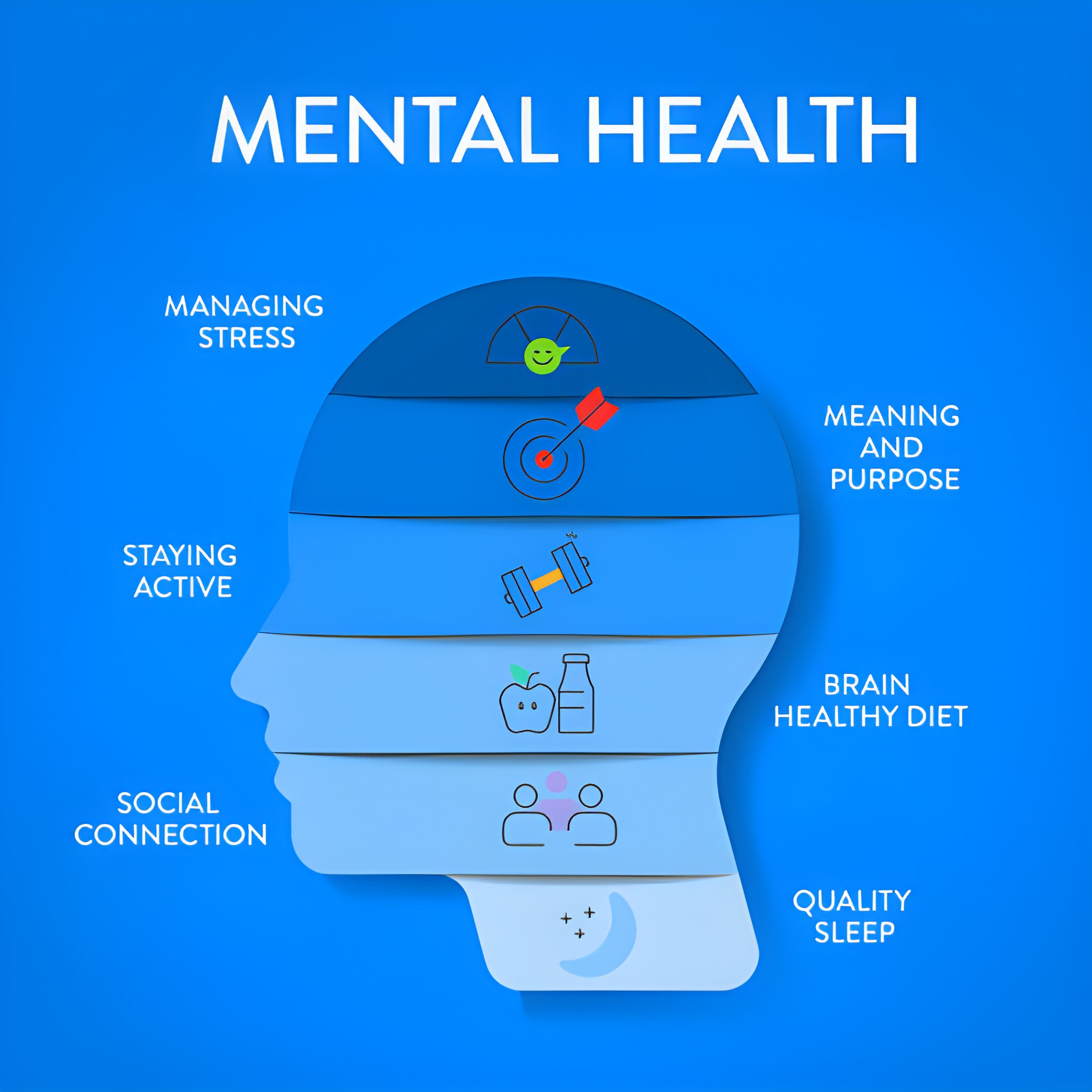How Does Mental Health Affect Physical Health are deeply connected. Many people think mental health is just about emotions and thoughts, while physical health is only about the body. But in reality, the mind and body work together. When your mental health suffers, your physical health can also decline, and when your physical health is weak, mental health can be affected too. So understanding how mental health affects physical health is essential for living a healthy life.
In this article, we will explore the connection between mental and physical health, how stress damages the body, the effects of depression and anxiety, the science behind mind–body interaction, and how to improve overall well-being.
What Is Mental Health?
How Does Mental Health Affect Physical Health includes your emotional, psychological, and social well-being. It affects how you think, feel, and act. Your mental health determines how you:
-
Handle stress
-
Make decisions
-
Build relationships
-
Feel motivated
-
Manage emotions
Good mental health doesn’t mean you are always happy. It means being able to cope with life’s difficulties and recover from setbacks.
What Is Physical Health?
Physical health is the condition of your body. It includes:
-
Strength and energy levels
-
Immune system function
-
Sleep quality
-
Diet and physical activity
-
Heart and organ health
Physical health is usually measured through fitness, medical reports, and absence of chronic disease.
How Mental Health Affects Physical Health
The brain controls the body. When your mind is under stress, your body reacts. Emotional pain can turn into physical pain.
Here are the main ways mental health affects physical health:
1. Stress Weakens the Immune System
When you experience stress for a short time, your body can handle it. But chronic stress can seriously damage your immune system
How it happens:
-
Stress triggers the release of the hormone cortisol
-
High cortisol levels reduce immunity
-
The body becomes weak and more vulnerable to infections
Effects:
-
Frequent colds
-
Slow wound healing
-
Increased inflammation
-
High blood pressure
So, staying mentally healthy helps your immune system stay strong.

2. Anxiety Affects Heart Health
When you are anxious, your breathing changes, your heart beats faster, and your muscles tense. Occasionally, this is not harmful. But long-term anxiety can lead to:
-
High blood pressure
-
Irregular heartbeat
-
Increased risk of heart attack
-
Chronic chest pain
Studies show that people with anxiety disorders are more likely to develop heart disease later in life.
3. Depression Can Cause Physical Pain
Depression doesn’t just occur in the mind. It affects the nervous system and increases body inflammation. People with depression commonly experience:
-
Migraines and headaches
-
Muscle or back pain
-
Digestive problems
-
Fatigue and low energy
This happens because depression disrupts communication between the brain and the body’s pain signals.
4. Sleep Problems and Mental Health Are Linked
Poor mental health often causes sleep disorders such as:
-
Insomnia (difficulty sleeping)
-
Disturbed sleep cycles
-
Nightmares
-
Excessive sleepiness
On the other hand, poor sleep worsens mental health. Without proper sleep, the brain cannot recover, leading to:
-
Mood swings
-
Irritability
-
Difficulty focusing
-
Memory problems
So improving sleep is essential for mental and physical well-being.
5. Mental Health Influences Eating Habits
People struggling with emotional stress may:
-
Overeat (emotional eating)
-
Lose appetite completely
-
Prefer junk food high in sugar or fat
This can lead to:
-
Obesity
-
Diabetes
-
Eating disorders (bulimia, anorexia)
-
Nutrient deficiencies
So mental balance supports a healthier diet.
6. Mental Health Affects Hormones
Hormones like cortisol, serotonin, dopamine, and adrenaline are heavily influenced by mental state.
If mental health is poor:
-
Hormonal imbalance occurs
-
Mood changes become frequent
-
Body functions become unstable
This affects energy, weight, menstrual cycle (for women), and even skin health.
Scientific Explanation: The Mind–Body Connection
The brain communicates with the body through:
-
The nervous system
-
Hormones
-
Blood circulation
When mental stress occurs, the brain signals different organs. These signals can either keep the body healthy or cause damage over time. This is why doctors say:
“Your mental health is as important as your physical health.”
Examples of How Mental Health Affects Physical Symptoms
| Mental Health Issue | Physical Effect |
|---|---|
| Stress | Headaches, weak immunity, heart strain |
| Anxiety | Rapid heartbeat, sweating, chest pain |
| Depression | Body aches, low energy, digestive issues |
| Chronic sadness | Inflammation, weakened nervous system |
| Trauma/PTSD | Sleep disorders, tension, chronic fatigue |
How to Improve Mental and Physical Health Together
Here are some proven ways:
1. Exercise Regularly
Exercise releases endorphins, the “happy hormones.”
It reduces stress and boosts physical fitness.
2. Get Enough Sleep
Aim for 7–9 hours per night.
3. Practice Mindfulness and Meditation
These reduce stress and calm the nervous system.
4. Eat Nutritious Foods
A balanced diet improves brain and gut health.
5. Stay Connected with People
Healthy relationships support emotional well-being.
6. Seek Professional Help When Needed
Therapists and counselors help manage deep emotional issues.
Frequently Asked Questions (FAQ)
1. Can mental health cause physical illness?
Yes. Long-term stress, anxiety, and depression can lead to heart disease, diabetes, chronic pain, and digestive disorders.
2. Can improving mental health improve physical health?
Absolutely. Reducing stress and improving emotional balance strengthens the immune system and boosts energy.
3. Why do emotions cause physical pain?
The brain controls pain signals. When mental health is disturbed, the brain mismanages pain perception, causing body aches.
Conclusion
Mental health and physical health are not separate. They are two sides of the same coin. When your mind suffers, your body reacts. Taking care of your mental well-being can protect your heart, immune system, sleep, and overall physical strength. A balanced lifestyle, supportive relationships, and emotional awareness can improve both mental and physical health.








